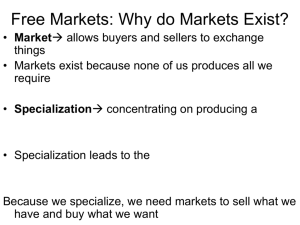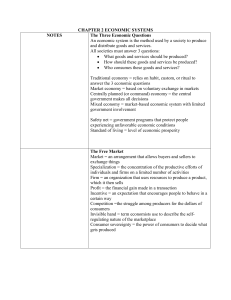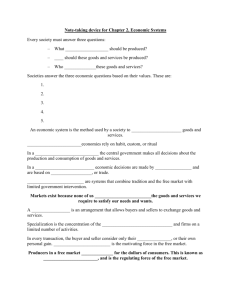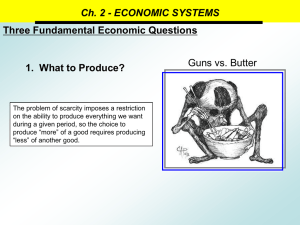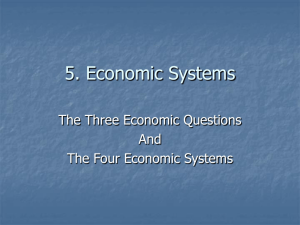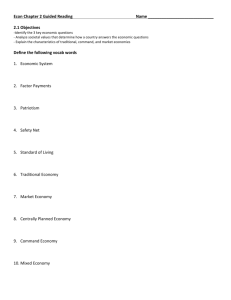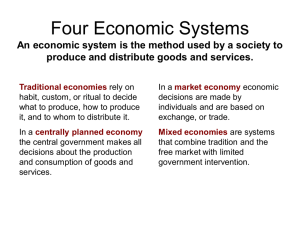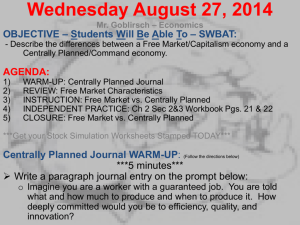Deciding whether to do or use one additional unit of some resource
advertisement
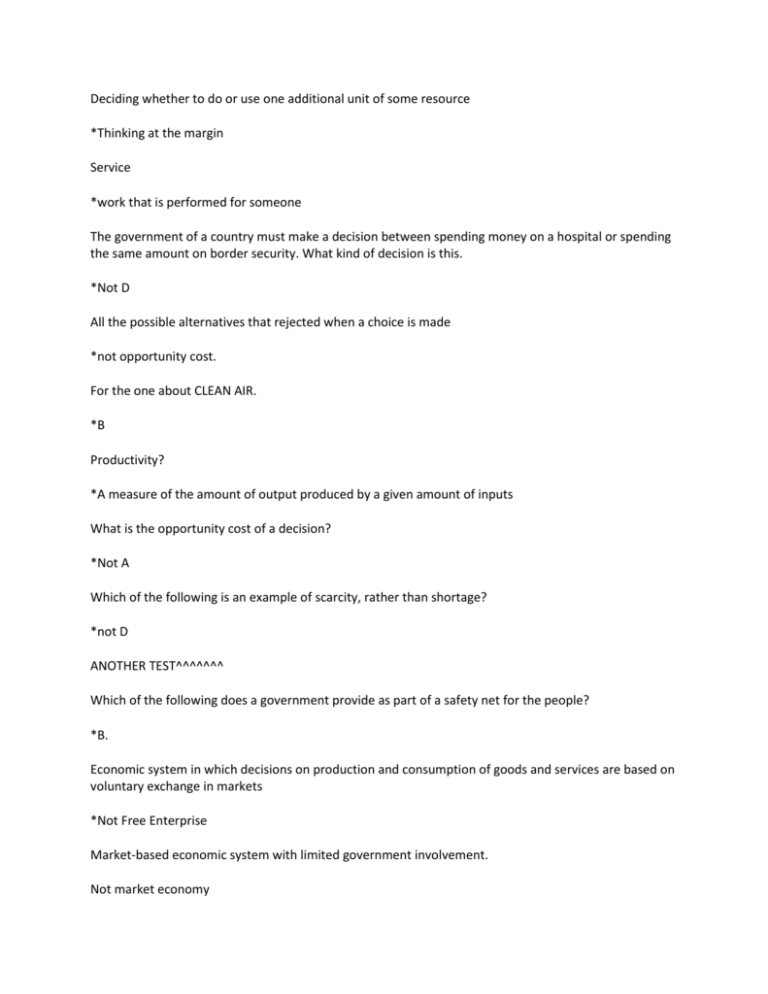
Deciding whether to do or use one additional unit of some resource *Thinking at the margin Service *work that is performed for someone The government of a country must make a decision between spending money on a hospital or spending the same amount on border security. What kind of decision is this. *Not D All the possible alternatives that rejected when a choice is made *not opportunity cost. For the one about CLEAN AIR. *B Productivity? *A measure of the amount of output produced by a given amount of inputs What is the opportunity cost of a decision? *Not A Which of the following is an example of scarcity, rather than shortage? *not D ANOTHER TEST^^^^^^^ Which of the following does a government provide as part of a safety net for the people? *B. Economic system in which decisions on production and consumption of goods and services are based on voluntary exchange in markets *Not Free Enterprise Market-based economic system with limited government involvement. Not market economy Level of economic prosperity *Not privatize The method used by society to produce and distribute goods and services *not Product market What is the struggle amoung various producers foe the consumer’s business called? Not A A market is any place that brings together buyers and sellers with a view to agreeing a price for B. Households pay firms for goods and services. Firms supply households with goods and services… Not B. An expectation that encourages people to behave in a certain way >incentive What is the function of an economic system? B. Government programs that protect people experiencing unfavorable… Safety net Land, labor and capital >Factors of production Economic system in which decisions on production and consumption of goods and service are based on…. >Market economy Profit is best described as Not A. Market-based economic system with limited government involvement >mixed economy What is the product market? Not C. Not A. Not B Centrally planned economy with all economic and political power resting in the hands of the central government. Communism The purpose of the the free enterprise systemis to give. D. What might be a hardship ffor citizens of a centrally planned economy… Not B. Which of the following is not true of centrally planned economies? A. Profit is best described as B. What is a example of a country that is currently privatizing by transferring ownership from the public sector to the private sector. A. Transferring money occurs when the government transfers money they collect to business and individuals. T. Why does even the free market economy need some government intervention? Not D. Not B. All national economies fall somewhere on the economicspectrum, which ranges from a completely Freemarket … A.North Korea Why does even free market economy need some government intervention? Not B. Centrally planned economies can work effectively toward exolicitly stated goals… Not C. The north korea government owns all property and all economic output almost all imports are banned. False Requiring strict obedience to someone such as a dictator Not communism The protection of private property by the 5th amendment of the F. What does it mean to privatize? Not D. Laissez faire is the economic doctrine developed from communist Manifesto. False. A government prints and distributes posters to inspire workers to increase their productivity. In which of economy does this most likely take place? D. What might be a hardship for citizens of a centrally planned economy making a transition to a planned economy? Not D. What is an important important advantage of a free market? Not A. Why does even a free market eonomy need some government intervention? A. A person who believed in the doctrine of laissez faire would dispprove of Not A. An economic system that permits the conduct of business with minimal government intervention Free enterprise Centrally planned economy with all economix and political power resting in the hands of the central government. Communism A period of change in an economy Transition One of four conditions for perfect competition is identical products also called commodities. T. How much control over price do companies in a perfectly competitive market have? Not B. All of the following are examples of a commodity, except B. Imperfect markets have higher prices than perfect markets. T. Which of the following is a condition of a perfectly competitive market? B. Some examples of barriers to entry are technology and start-up costs. T. What is one of the effects that the internet has had on business? Not B. In practice, competition is often reduced by all of the following EXCEPT: Not A. What kind of market runs most efficiently when one large firm supplies all of the output? A. How does a company arrange to sell its products to people who are not willing to pay the top price for them? Not. D. Not A. Product that is considered the same no matter who makes or sells it. >commodity A monopolist will set its production at a level where marginal cost is equal to Not C. A license that gives the inventor of a new product the exclusive rights to sell it for a certain period of time >Patent Why do companies practice price discrimination? D. Barriers to entry can include technology, start-up costs and imperfect competition. T. Why does the government sometimes give monopoly power to a company by issuing a patent? D. A government-issued right to operate a business License What is one of the effects that the internet has had on business? Not C. Which of these is an example of economies of scale? B. Cartels are difficult to operate for which of the following reasons? Not B. Barriers to entry can include technology, start-up costs and imperfect competition. T. What is the definition of an oligopoly? Which of the following is an example of an oligopoly? Not B. Sunshine island has three large supermarkets that supply most of the groceries for the island’s population. How would you describe the market for the groceries on sunshine Island? C. Which of the following statements is true about profits in a monopolistically competition market? Not A. A monopolist will set its production at a level where marginal cost is equal to A. Which of the following is not a characteristic of monopolistic completion? Not B. How does a company arrange to sell its products to people who are unwilling to pay the top price for them? C. Which of the following products is an example of monopolistic competition? D. Which of the following is not a form of non price competition? Not B. Which of the following is not an example of barriers to entry? B.
